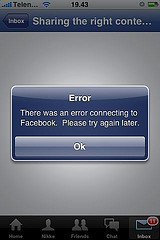Remember the scene at the end of Vanilla Sky? The one where Tom Cruise’s character is running down the hallway screaming “Tech Support!!!” I really liked that scene. It was one of those literal “laugh out loud” moments in the theatre.
The irony is that, were I experiencing an existential crisis in which the technology and psychopharmacology used to re-structure my life were malfunctioning, I can’t imagine actually having to contact “tech support.” Because, based on most experiences, I think I would be screwed.
Take, for example, a recent support request that I filed with my ISP. I was requesting a simple change in options. As a result, they disconnected my service entirely. A day later it was back on, but only after three stressful phone calls. Then I receive an email link asking me to verify my primary email address. The link didn’t work. So I receive a nasty-gram saying I still need to verify. I try again. The link doesn’t work. Rinse and repeat. I email tech support. My response was a lengthy form-letter email explaining why they need to my verify email address, without taking any steps to solve the issue that I can’t.
An absolute vacuum in which intelligence cannot exist.
Now, not all tech support is created equal. Take Apple, for instance. Not only do their Genius Bar techs know exactly what to do with my devices, they’ve actually known more about other manufacturer’s devices in the past than the other manufacturer’s tech support. If only every experience could be like that.
Alas, however, when we call tech support…or customer service of any variety…we generally receive a reply that is obviously automatically generated (no, automated email, I don’t believe you were really written by “Kerri”). When we call, and speak to a living person, they are almost always not permitted to think for themselves, but must follow a rigid script that always begins by telling me how they would be happy to assist me.
And, actually, I know you’re not happy to assist me! I know you’re just doing your job. And I’m okay with that. So just do that job, and speak to me like I’m a person, without doing me the insult of reading to me off of a glorified teleprompter. I don’t need an emotional warm-fuzzy to be a satisfied customer…I just need you to support your product (And, no, I don’t believe your name is Roger, what with your accent and all).
Why is it that corporations force those who are assisting us by phone or email to not think for themselves? How can they not realize that having someone read a script to make them sound genuine and polite is actually the antithesis of permitting them to sound genuine and polite? Why are they so afraid to tolerate individual personalities? Has the industrial age so elevated the status of automaton that individuality and humanity can’t be tolerated?
I wish we were in a post-industrial age, but we’re obviously not, because corporate culture will not tolerate creativity, at least not in my experience. And when creativity is encouraged, it is strictly controlled, and thus, by definition, not true creativity. I hope we move toward the post-industrial at some point in the near future. And, I think I know when I’ll be able to tell that we are. I think it will be when every experience of customer service is like the one I experienced Monday evening at a locally-owned small business: matter-of-fact, but genuinely polite and outside-the-box, while also quick and efficient.
When someone isn’t forced to say, “My name is ______ and I’d be happy to assist you with that today, Mr. Brown.” Or forced to try to sell me something else at the end of a transaction.
If employers don’t permit employees to think for themselves, to learn and grow from mistakes, and think outside of the box, then we may just experience a generation incapable of assuming leadership professionally because they have never developed critical thinking skills. Especially because those skills aren’t taught in our public schools anyway.
And who knows what we’ll be met with when we’re running down the corridor of life screaming for tech support?
A scary thought, indeed.
Photo Attribution: upyernoz




